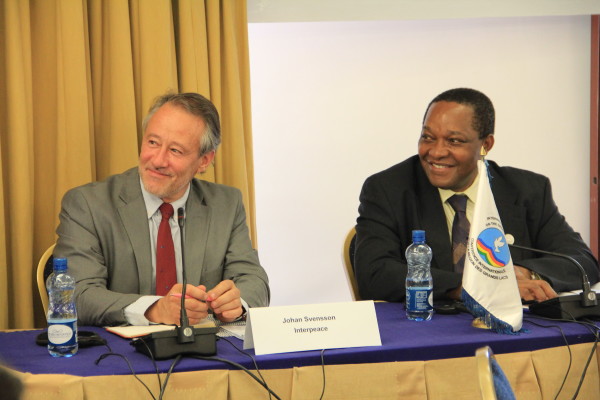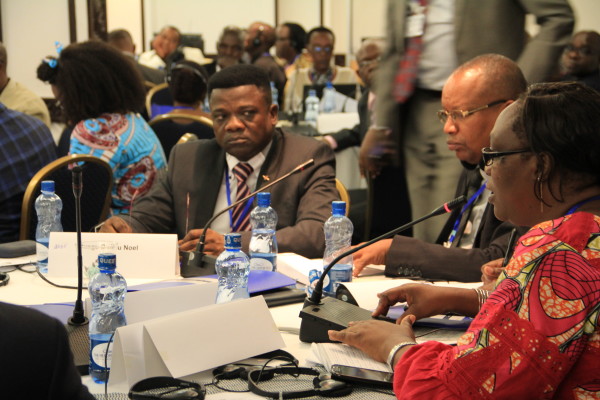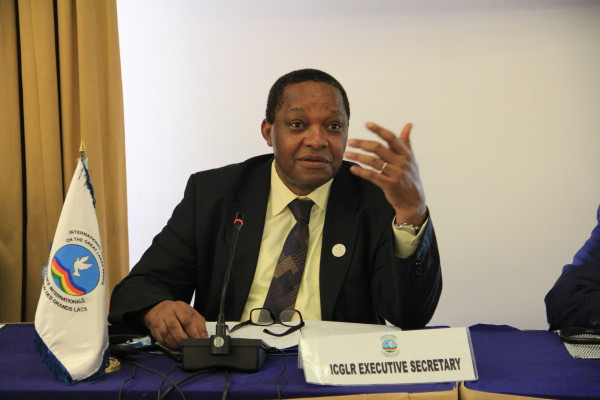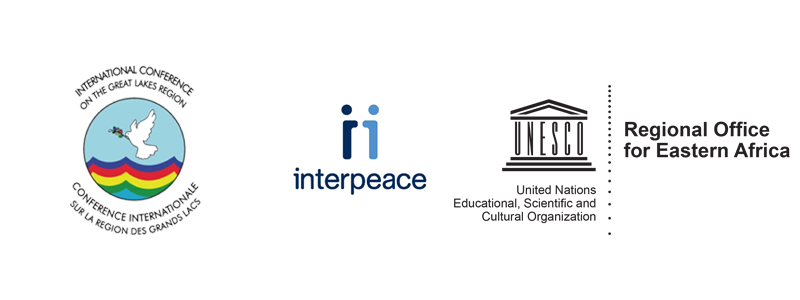On March 3-4, 2016, the International Conference on the Great Lakes Region (ICGLR), Interpeace and UNESCO successfully organized a regional summit on Peace Education in the African Great Lakes Region in Nairobi, Kenya.
Delegates at the two-day summit included officials from government ministries responsible for education, gender and youth; parliamentarians; leaders of provincial governments; education practitioners from Burundi, the Democratic Republic of Congo (DRC), Rwanda and Uganda; as well as technical experts in peacebuilding and peace education from Interpeace and UNESCO.
The summit was officially opened by Ambassador Josephine Gaita, ICGLR National Coordinator for Kenya. Its focus over the subsequent two days was on the implementation of formal peace education in the three ICGLR member states of Burundi, the DRC and Rwanda. The Republic of Uganda was also present as an active observer, while South Sudan was represented by its ICGLR National Coordinator.
The summit was premised on two prior occasions. The first was an Extraordinary Summit of ICGLR Heads of State and Government on Youth Unemployment, held on 24 July 2014 in Nairobi, which emphasized the important role of the youth in the pursuit of peace, security and stability within the region. The second was a 2014 participatory action research carried out by Interpeace and its six partner organisations in Rwanda, Burundi and the eastern DRC. The research was based on consultations with diverse actors across the Great Lakes region and revealed that most people considered identity-based stereotypes and manipulations as a fundamental obstacle to sustainable peace in the region. The research participants suggested that peace education could serve as a priority intervention to address challenges related to identity-based stereotypes and manipulation, arguing that peace education could both strengthen existing peacebuilding efforts and help in the prevention of conflict among future generations.
Proceedings included presentations on the current state of peace education in Burundi, the DRC, Rwanda and Uganda; expert presentations on the policy and practice of peace education; plenary discussions; and breakout sessions where country delegations had the opportunity to retreat and come up with their country-specific ideas on the way forward for the effective implementation of formal peace education. Participants expressed the need for regional level peace education strategies to respond to the intermittent conflicts in the Great Lakes region, which often have a cross-border dimension.
It emerged from the discussions that peace education efforts already existed in all the three countries, albeit at varying levels of implementation. Among the challenges identified were the need to develop comprehensive peace education frameworks, as well as a pedagogy that would facilitate a harmonized understanding of formal peace education in all the three countries. Country delegations committed themselves to sharing the findings of the summit with the concerned actors in their respective countries, in order to make sure that the summit results will inform future discourse on peace education.

Interpeace Regional Director for Eastern and Central Africa, Johan Svensson (left) and ICGLR Executive Secretary Ntuba Luaba at the summit. Photo credit: Interpeace
Interpeace’s Regional Director for Eastern and Central Africa (ECA), Johan Svensson, praised the national delegations and the ICGLR for taking into account the sentiments of the local populations in their efforts to integrate formal peace education both domestically and across the region.
“Your commitment as stakeholders is inspiring because you are responding directly to your people’s call for peace education,” Mr Svensson remarked at the summit.
These findings were emphasized by ICGLR Executive Secretary, Professor Ntumba Luaba, who called for the creation of a regional ICGLR peace education programme and praised the delegates for taking the initial steps towards the harmonization of formal peace education for sustainable peace in the future.
“Peace education has the potential to create a new generation of women, men and youth who will be the guardians of peace in the region,” Professor Ntumba told participants at the summit.
Professor Luaba also lauded ICGLR’s partnership with Interpeace, which made it possible for the summit to take place. He also suggested the joint organisation of a similar Peace Education summit with the participation of all the twelve ICGLR Member States. The ICGLR’s twelve member states are Angola, Burundi, the Central African Republic, the Republic of Congo, the DRC, Kenya, Rwanda, Sudan, South Sudan, Tanzania, Uganda and Zambia.
More information
Read about Interpeace’s ‘Cross-Border Dialogue for Peace in the Great Lakes programme’
Read an opinion piece by ICGLR Executive Secretary Ntumba Luaba on youth and peace education in the African Great Lakes region
Dates: 3-4 March 2016
Venue: Heron Court Hotel, Nairobi, Kenya
On 3-4 March 2016, key stakeholders from Burundi, the Democratic Republic of Congo (DRC), Rwanda and Uganda will participate in a Peace Education Summit, co-organized by the International Conference on the Great Lakes Region (ICGLR), UNESCO and Interpeace at the Heron Court Hotel in Nairobi, Kenya.
The aim of the two-day Summit is to promote a harmonized understanding of formal peace education in the region, which has over the past five decades suffered some of the world deadliest and most intractable conflicts.
Writing in a recent op-ed published by the East African newspaper ahead of the summit, ICGLR Executive Secretary, His Excellency Professor Ntumba Luaba, described the dire effects of the civil wars, genocides and cross-border conflicts that have afflicted the region. Professor Luaba decried the fact that the youth have often been at the centre of these conflicts, which claimed over six million civilian lives since the 1990s alone and have produced the world’s highest number of fatalities since the Second World War.
“Young people have conspicuously been active participants in the hundreds of armed groups that have traversed the region since independence in the 1960s, operating across sovereign borders with an unsettling ease and leaving great devastation in their wake,” Professor Ntumba wrote.
The summit’s focus on youth and formal peace education is informed by two occasions. The first is an Extraordinary Summit of ICGLR Heads of States on Youth Unemployment, held on 24 July 2014 in Nairobi, which emphasized the important role of the youth in the pursuit of peace, security and stability within the region. The second is a research study carried out in 2014 by Interpeace and six partner organisations in Rwanda, Burundi and the eastern Democratic Republic of Congo (DRC). Among other important findings, the research showed that the people in the three countries generally identified ethnic and nationalistic animosities as a fundamental impediment to peace in the region and endorsed the adoption of formal peace education as a crucial step towards strengthening existing peacebuilding efforts, and more importantly helping in the prevention of conflict among future generations.
Participants in the summit will include high level officials from government ministries responsible for education and youth affairs from the four countries, as well as Peace Education experts from UNESCO. The summit will also seek to identify key challenges for peace education within these countries, as well as at the regional level, and to discuss ways of addressing these challenges.
Media contacts:
MacDonald Mwakasendile
Director of Communications,
ICGLR,
Tel: +25779856659
Email: macdonald.mwakasendile@icglr.org
press@icglr.org ;
Twitter: @_icglr
Philip Emase
Communications Officer, Eastern & Central Africa, Interpeace
Tel: +254722801966
Email: emase@interpeace.org
Twitter: @InterpeaceECA
The Peace Talks will be held in Ottawa on 19 April, 2016.
Organized under the theme “Let’s build peace through diversity”, the Ottawa Peace Talks aims to inspire reflection and discussion about how respect for diversity can promote more peaceful societies through inclusion, both in Canada and globally.
This event marks the first time the Peace Talks are held in Canada. Speakers coming from diverse backgrounds will share their personal experiences, stories and ideas to highlight the importance of building peace through broad and diverse participation. The Ottawa Peace Talks will also look at the role of individual Canadians, and Canada as a whole, to support greater inclusion for peace at home and at the global level.
The Peace Talks are an event series where speakers from different sectors share their personal stories, ideas and practical solutions to build peace. They began in 2013, with the first ever Geneva Peace Talks being co-organized by the United Nations Office at Geneva, the Geneva Peacebuilding Platform and Interpeace.
The Ottawa Peace Talks is co-organized by the Global Centre for Pluralism, currently housed in the Delegation of the Ismaili Imamat, and Interpeace, with the support of One World Dialogue and the Ottawa hub of the Global Shapers Community.
Join the conversation at #OttawaPeaceTalks and keep up to date at PeaceTalks.net.
Information on registration and event speakers will follow shortly.
Somaliland takes another step forward in its democratization process with the launch of biometric voter registration
After several months of careful preparations, Somaliland marked an important step forward in the democratization process with the launch of a biometric voter registration process on 16 January 2016. The Somaliland National Electoral Commission (NEC) launched the operation in Togdheer region, following which voters will be registered over the next months throughout all the six regions of Somaliland.
Somaliland has held five successful elections since 2002 as part of its democratization process. While national and international observers have generally deemed these elections peaceful and credible, all but one have been held without a voter register, leaving the process susceptible to problems such as multiple voting.
As the Academy for Peace and Development (APD) notes in its report on Confronting the Future of Somaliland’s Democracy, the experiences of the 2012 local council elections particularly convinced political actors that developing a voter register was essential for the credibility and integrity of future elections in Somaliland. APD is Interpeace’s long-standing partner organization in Somaliland and the two organizations have worked closely on democratisation in Somaliland together. Interpeace has been NEC’s international partner since 2004, facilitating technical support and providing a peacebuilding lens to the democratization process in collaboration with APD.
NEC is using an iris-capture biometric voter registration system – the first of its kind to be used in Africa to register voters across Somaliland. This is an important step forward in the democratization process for Somaliland as well as a milestone for the region.
The African Great Lakes region has experienced intermittent armed conflict for the past six decades, often resulting in large population displacements and serious humanitarian crises. In the three bordering countries of Rwanda, Burundi and the Democratic Republic of Congo (DRC), the conflicts have decidedly taken a cross-border dimension. A conflict in one of the three countries almost always spills over into the other two.
Although most analysts have largely attributed these conflicts to rivalries over political power, ethnic tensions as well as control of mineral resources, citizens from the three countries have emphasized that land additionally plays a significant role in the region’s conflicts. The citizens were responding to a 2014 research on Land, Identity, Population Movement and Conflicts in the Great Lakes, conducted by Interpeace and its six partner organizations in Great Lakes region. These are the Centre for Conflict Alert and Prevention (CENAP) in Burundi; Never Again Rwanda (NAR) in Rwanda; and four organizations in eastern DRC: Action pour la Paix et la Concorde (APC), Pole Institute, Centre d’Etudes Juridiques Appliquées (CEJA) and Réseau d’Innovation Organisationnelle (RIO).
Researchers from Interpeace and these partner organizations interviewed a total of 1680 people across the region, among them ordinary citizens, top-level national decision makers and representatives of regional organizations. This breadth of respondents allowed the programme team to gain an in-depth understanding of the nexus between land, identity and population movement in the conflicts that frequently afflict the region. The participatory research process also gave the citizens an opportunity to openly discuss obstacles to peace with each other as well as to suggest possible solutions from their perspectives.
Interpeace and its partners presented the findings of the study at a Regional Stakeholders’ forum organized on 2-3 December 2015 in Kinshasa, DRC, under the auspices of the ‘Cross-border dialogue for peace in the Great Lakes region’ programme. The findings elicited rich discussions at the forum, which brought together over 160 participants from across the region, among them representatives of national governments, local communities, regional organizations, and the civil society from Rwanda, Burundi and the DRC, as well as the international community. Beyond validating and obtaining feedback on the study, the forum also sought to provide an open space for dialogue between key actors for peace in the Great Lakes region, at a time when election-related instability and diplomatic tensions threaten regional peace.
The Secretary General of the Economic Community of Central African States (ECCAS), Baudouin Hamuli Kabarhuza, emphasized the need for focussed discussions on the land question in the region, while the DRC’s minister for land affairs, Gustave Boloko Nkeli, described the discussions as ‘timely’. "This forum comes at a time when we are in the midst of implementing programmes to manage land-related conflicts as part of the promotion of peace in the DRC," the minister said.
Participants also identified the priority recommendations proposed by citizens during the participatory action research process. Working together in groups comprising a mix of participants from across the three countries, the participants chose peace education combined with entrepreneurship as one key recommendation in the effort to help alleviate land-related conflict. Participants emphasized that this recommendation should particularly focus on youth and women. They also chose reconciliation in the three countries as the next topic for a participatory action research, to help everyone involved to better understand ways in which peace and education aimed at youth and women can be fostered.
Sweden’s Ambassador to the DRC, Annika Ben-David, urged policy makers to place the research findings into consideration as they represent views from the grassroots. "We hope that this research, which captures the needs and priorities of local populations, will be integrated and used in decision-making processes when designing new policies and programmes for peaceful conflict resolution and social cohesion in the Great Lakes region,” Ambassador Ben-David said in her remarks at the forum.
Towards the close of the forum, the Executive Secretary of the Economic Community of the Great Lakes Countries (CEPGL), Herman Tuyaga, summed up the discussions with a call to action, reminding the participants that everyone has a role to play in the quest for sustainable peace in the region.
Read the report of the meeting here (in French).
More from the regional press
Radio Spot (Burundi, RDC et Rwanda): Forum Régional de Kinshasa
Iwacu (Burundi): Les organisations de la Société Civile du Burundi, de la RDC et du Rwanda engagées ensemble pour la paix
Iwacu (Burundi): Ces terres des autres, qui sont à nous
Journal Indépendant d’Informations Générales (RDC) « La paix par le dialogue et l’éducation» credo commun à 7 organisations dans la région des Grands Lacs
L'Observateur (RDC): Dialogue Transfrontalier dans la région des Grands Lacs, Défis et enjeux : Terre, Identités, Pouvoir et Mouvement des Populations
Radio Okapi (RDC): Kinshasa abritera une conférence sur les conflits dans les Grands lacs
Radio Okapi (RDC): Promouvoir l’entreprenariat des jeunes et des femmes dans les Grands Lacs
The New Times (Rwanda): My Land, My Life, My Identity
On 15 December, our Director-General Scott Weber took the stage alongside representatives of the Tunisian National Dialogue Quartet, who received the prize for their role in Tunisia in the aftermath of the Jasmine Revolution.
You can watch the full webcast of the event here.
The day’s discussion focused on the role of civil society in peacebuilding. Panelists were asked whether Tunisia can point the way as an example of successful peacebuilding.
The Tunisian Quartet was formed in 2013, at a precarious point in Tunisia’s democratization process. The Quarter includes the Tunisian General Labour Union (UGTT), the Tunisian Confederation of Industry, Trade and Handicrafts (UTICA), the Tunisian Human Rights League (LTDH) and the Tunisian Order of Lawyers. It took the intervention of the four civil society organizations, with deep roots in the social structures and the fabric of society, to reinvigorate the political process and reintroduce a sense of legitimacy.
“The success was achieved through acceptance, dialogue and listening to each other,” Ouided Bouchamaoui, President of UTICA, said. “We had the trust of the people behind us and we had the support of other civil society organizations.”
“The Tunisian approach can be a model for others,” she continued.
In a pre-event article on the award of the Nobel Peace Prize, Weber stated that despite there being no cookie cutter solution to peace, and that “every context is different and requires home-grown solutions,” important lessons can be still learned from the Quartet.
At the event Weber emphasized that “participation and inclusion are central to peacebuilding and must become the way societies deal with their problems” and that no one can build peace alone. “Successful peacebuilding requires different actors working together as a group to ensure effective collaboration, and the Tunisian quartet is an example of that.”
“The journey towards peace is never finished,” he concluded and stated that lessons must continue to be shared among peacebuilders across the world.
Other panelists included Isabella Lövin, Minister for International Development and Cooperation, Karin Enström, Foreign Policy Spokesperson of the Moderate Party, Mats Karlsson, Director for the Swedish Institute of International Affairs and Fanny Härgestam, a journalist who has reported extensively on Tunisia. The event was moderated by Henrik Hammargren, executive Director of the Dag Hammarskjöld Foundation and opened by Urban Ahlin, speaker of the Swedish Parliament.
We would like to thank the Dag Hammarskjöld Foundation, the Swedish Parliament and the Swedish Institute of International Affairs for organizing the event and for welcoming our Director-General.


























